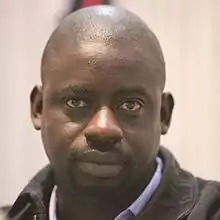Felwine Sarr
Felwine Sarr (born 11 September 1972) is a Senegalese scholar,[1] musician and writer born in Sine Saloum, Niodior Arrondissement. He studied Economics[2] and taught at the Gaston Berger University (Senegal) until his recent move to Duke.[3]

Biography
Born on 11 September 1972, Felwine Sarr conducted his primary and secondary education in Senegal, and then went to France where he obtained an agrégation in Economics. In 2011, he became dean of the Economics and Management faculty of the University Gaston Berger of Saint-Louis, and head of the new faculty of Civilizations, Religions, Arts and Communication (CRAC) of the same university, and for which he was in charge of the implementation.[4] His lectures and academic research[5] focus on economic policies, development, economy, econometrics, epistemology and history of religious ideas.[6]
Publications and musical career
Sarr is also a writer[7] and has been awarded the Grand Prix of Literary Associations 2016 (Research Category) for his work entitled "Afrotopia".[8][9] He has published to date DAHIJ (Gallimard, 2009), 105 Rue Carnot (Mémoire d'Encrier, 2011), Médiations Africaines (Mémoire d'Encrier, 2012) and "Afrotopia" (Philippe Rey, 2016),[10] which is an essay wherein he appeals to a conceptual decolonization and a reappropriation of the metaphors of their future by the Africans. As a musician he has published three musical pieces thus far: Civilisation ou Barbarie (2000), Les Mots du Récit (2005), and Bassai (2007). With the writers Boubacar Boris Diop and Nafissatou Dia, he cofounded the publishing house known as Jimsaan. Since 2014, he is vice-president of the boards of directors at OSIWA (open society for West Africa). Felwine Sarr is also editor of the review Journal of African Transformation (CODESRIA-UNECA). In October 2016, he put together with Achille Mbembe the Ateliers de la Pensée (the workshops of the thought) which gathers thirty of Afro-diasporic scholars and artists in Dakar and Saint-Louis in order to think the contemporary world's transformations.
In 2018, Sarr and French art historian Bénédicte Savoy were asked by the president of France, Emmanuel Macron, to investigate the state of African heritage in French museums. As a result of this, Macron commissioned a report on the possibilities of restitution of African cultural heritage from France to Africa (in French: Rapport sur la restitution du patrimoine culturel africain). This Report on the restitution of African cultural heritage was presented to Macron in November 2018 and published online in an official French version and an English translation.[11]
Awards
- 2010, Abdoulaye Fadiga prize for research in Economics.[12]
- 2016, Grand Prix of Literary Associations (Research Category).[8]
- 2018, The Nicolás Guillén Outstanding Achievements in Philosophical Literature Award, given by the Caribbean Philosophical Association
Bibliography
Novels
Essays
- "Afrotopia" (awarded the Grand Prix of Literary Associations 2016—Research Category)[8]
References
- "Publications récentes" (in French). Groupe d'Etude et de Recherche en Sciences Economiques (GERSEG). Retrieved 21 February 2017.
- "Felwine Sarr : "L'Afrique n'a personne à rattraper"". Libération.fr (in French). 24 March 2016. Retrieved 31 July 2019.
- Source (about teaching in the University of Gaston Berger): RFI
- Source: rawmaterial.company.org
- "Felwine Sarr's publications". Cairn International. Retrieved 21 February 2017.
- Ba, Mehdi (8 October 2013). "Felwine Sarr: 'Le poids du religieux dans nos sociétés est un tabou'" (in French). JeuneAfrique.com. Retrieved 21 February 2017.
- TV5Monde (25 February 2016). "Grand Angle: Le penseur sénégalais qui veut décoloniser les esprits" (in French). YouTube. Retrieved 21 February 2017.
- Source: Camer.be
- Boukari-Yabara, Amzat. "Felwine Sarr: Utopia". Retrieved 28 July 2019.
- Marivat, Gladys (29 March 2016). "L'utopie africaine, selon Felwine Sarr". Le Monde (in French). ISSN 1950-6244. Retrieved 21 February 2017.
- Sarr, Felwine and Savoy, Bénédicte. "The Restitution of African Cultural Heritage. Toward a New Relational Ethics". Retrieved 28 July 2019.
- Source: Le soleil (AllAfrica.com)